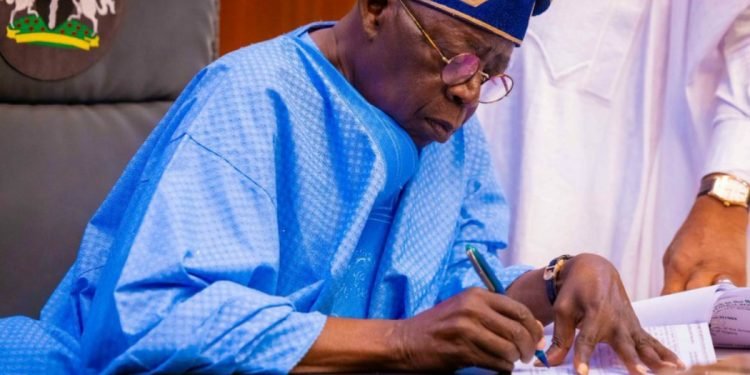President Bola Tinubu on Monday signed the 2023 Student Loan Act into law, paving way for Nigerians to access interest-free loans for the purpose of tertiary education.
The bill titled ‘A Bill for an Act to provide for easy access to higher education for Nigerians through an interest-free loan from the Nigerian Education Bank established in this Act to provide education for Nigerians and other purposes connected thereto,’ seeks to “provide easy access to higher education for Nigerians through students’ loan with a view of providing education for all Nigerians,” according to the explanatory note.
Benefits
- Interest free loan which the student will pay back only the amount collected after graduation.
- The bill enables access to all indigent students without any form of discrimination arising from tribe, gender, religion, disability or position.
- According to the bill, the loan is only for the payment of tuition fees.
- The act stipulates the establishment of Nigerian Education Bank tasked with providing education for all Nigerians with respect to the loan.
Eligibility:
- Applicants must be Nigerian who have secured an admission into a Nigerian university, polytechnic, college of education, or vocational schools owned by the Federal government or any state government.
- Applicant’s income or family income must be less than N500,000 (five hundred thousand) per year.
- Applicants must provide at least 2 guarantors, who must be civil servant above Level 12 or Lawyer with at least 10 years post-call experience; or a Judicial officers or a Justices of the Peace.
Those who will be disqualified:
The bill listed certain circumstances that will disqualify an applicant from accessing the loan.
Students are disqualified from applying if;
- They have defaulted on any loan granted by any organization.
- They have been found guilty of examination malpractice.
- They have been convicted of any felony, offences or fraud.
- They have ever been convicted of drug offence.
- Their parents have defaulted on any loan before.
Method of application
Under the act, eligible students must apply to the Chairman of the Education Bank through the Student Affairs Offices of their respective institutions alongside relevant documents.
Required documents:
- A cover letter signed by the vice-chancellor, rector, or the head of the institution, along with the student affairs officer of the institution.
- Copy of students admission letter.
- Letter by guarantors addressed to the Chairman, Governing board of the Bank recommending the student for the loan and accepting liability in the event of default by the student.
- Two passport photograph of the guarantors; name of their employers with evidence of employment. If the guarantor is self employed, then the particulars of his business as registered with the Corporate Affairs Commission or any other appropriate authority and his bankers must be provided.
Disbursement and Repayment
According to the Act, processing of any application and disbursement shall be within 30 days from the day the application reached the bank.
Repayment of the loan shall commence two years after completion of the National Youth Service Corps (NYSC) program.
Payments will be 10% direct deductions from beneficiaries salary account. If for example if you are earning N50,000, then your employer will deduct N5,000 monthly and remit same to the Education Bank on your behalf for the repayment for your loan.
Self employed graduates will have only 60 days to document their income for deductions and are required to remit 10% of their monthly profits or face penalty.
The documentation must include relevant information, such as business name, address, location, registration documents (if applicable), bank details, partner names, and director/shareholder names.
Default
The bill prescribes a two year imprisonment or N500,000 fine or both for students who default in repayment or those aiding them upon conviction.
Education Bank to be established
The Student Loan Bill will also establish Nigerian Education Bank tasked with supervision, coordination, administration and monitoring of all student loans in Nigeria.
The bank will approve and disburse interest-free loan to qualified applicants in tertiary institutions for the payment of tuition fees.
It will also ensure constant supply of loans to qualified applicants for the purpose of providing education to all Nigerians.
According to the Act, the Chairman of the bank’s governing board must be a professor and a retired Vice Chancellor of any Nigerian University.
The Bank will start with a share capital of N1billion at N1/share. The federal government will hold 100% of the shares.
The bank’s head office shall be located in the Federal Capital Territory. It may establish branches in any state of its choice.
Sources of fund for the bank;
The bill also establishes the “Students Loan Fund” which will serve as the fund in the bank to be accessible by students.
All monies or any contributions to the fund will be managed by the education bank for the purpose of granting and disbursing loan to qualified applicants.
The fund will get money supply from the following sources;
- Education Bonds
- All interests arising from deposits of the bank
- Education endowment fund scheme
- 1% of taxes, levels and duties to FG through Federal
- Inland Revenue Services (FIRS), Nigerian Immigration Services (NIS) and Nigerian Customs Service.
- 1% of FG’s profits from Oil and other minerals
- All monies given to the bank in form of grants, gifts, and any other endowments.
- The bank’s interest and revenue from savings and investments.
Ifunanya Ikueze is an Engineer, Safety Professional, Writer, Investor, Entrepreneur and Educator.

























































